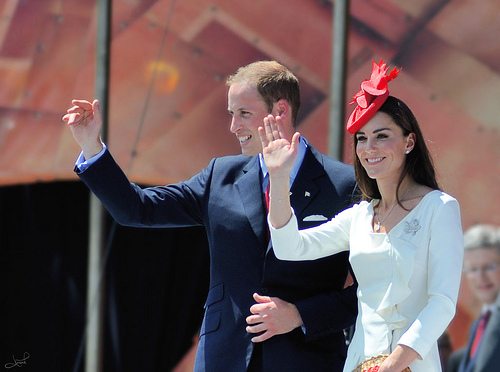

Features
What the FTSE 100 may look like when William and Kate’s child is 14 years old
The Duchess of Cambridge will give birth to her first child over the next few hours, after going into labour on Monday morning. The world that the royal boy or girl will inherit is set to see significant changes in the coming decades – and none more so than in the financial system.
In 2027, when the child is 14, China is the world’s largest economy and is leading global technological development. India’s GDP has surged past the likes of France and Germany.
The global population is more than 8 billion and Europe, where average life expectancy is over 90, has twice as many people over 65 than it does children under 15. Meanwhile, the UK is now home to over 70 million people.
Water has become the most sought after commodity, triggering conflict (both hot and cold) between countries that were once allies or had previously fought over oil.
The impacts of climate change are making life in the developing world increasingly difficult, as crops are affected by droughts and floods and diseases are spread in the water.
The FTSE 100, the index that represents the performance of the 100 largest UK listed blue chip companies, also looks very different.
– Basic materials: increase due to significant commodity scarcity
– Consumer goods: increase as global urban middle class continues to grow in ‘emerged’ economies
– Industrials: increase as they become the ‘financial services’ of the 2050s
– Utilities: increase due to water needs and as renewables head to becoming the oil and gas of the 2050s
– Consumer services: decrease as the market diversifies and allows smaller firms into play
– Healthcare: decrease despite ageing population, as generic drugs begin to dominate market and power of Big Pharma fragments
– Telecommunications: decrease as this sector as many pure telecoms players moving into or are acquired by consumer goods players
– Technology: decrease as Moore’s law continues to drive down price of technology. Increased innovation and alternative investing models moves a lot of the technology sector out of the listed space
– Financials: decrease as other sectors become more stable and direct or alternative investment grows
A recent study claimed that the global recession, which began in 2008, has spawned a new era of environmentally-conscious teenagers in the US. Some 63% of recession-era 12th graders (17 or 18-year-olds) said they made an effort to turn down the heat at home to save energy, compared with 55% before the recession hit. Meanwhile, 36% said they would be willing to use a bicycle or public transport to get to work, up from 28%.
This chimes well with a survey by investor website Millionaire Corner, which found that Generation Y – also known as the Millennial Generation – cared more about socially responsible investment than any other generation.
It’s likely, or perhaps inevitable, that the Duke and Duchess of Cambridge’s child will grow up caring for the environment and society to an even greater extent than current youngsters do. And with the Prince of Wales – one of the greenest royals in the world – as a grandfather, this is even more probable.
After his son’s fourth birthday recently, Blue & Green Tomorrow publisher Simon Leadbetter wrote about the differences between being that age in 2013 compared to 1976. He concluded, “When this digitally-connected, socially-liberal and environmentally-aware generation comes of age, those who wish to preserve the status quo and are responsible for passing on an economic and environmental debt are going to get a bit of a shock.”
The evidence from the Millionaire Corner survey and other research should provide optimism over the future of finance and investment. The majority of these children will grow into adults who invest and bank sustainably, responsibly and ethically – particularly as the financial system naturally becomes more sustainable.
But while they are too young to do so, today’s investors need to ensure they are investing for tomorrow. We need to invest in the future we want for our children and grandchildren.
Further reading:
Are we investing in the future we want for our children and grandchildren?
Happy birthday, Will! Being 4 years old in 2013 compared to 1976
‘There are no moral or ethical considerations when investing’
Ethical investors are not tree huggers, but air breathers (and responsible global citizens)
Why I’ll be investing my children’s junior ISA funds sustainably


 Environment12 months ago
Environment12 months agoAre Polymer Banknotes: an Eco-Friendly Trend or a Groundswell?

 Features11 months ago
Features11 months agoEco-Friendly Cryptocurrencies: Sustainable Investment Choices

 Features12 months ago
Features12 months agoEco-Friendly Crypto Traders Must Find the Right Exchange

 Energy11 months ago
Energy11 months agoThe Growing Role of Solar Panels in Ireland’s Energy Future



























